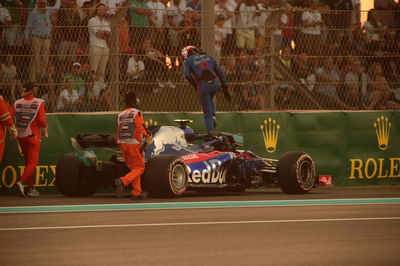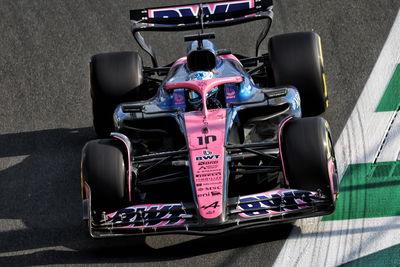F1 Qualifying Analysis: Another warning shot to Hamilton's rivals
The Abu Dhabi Grand Prix may be a dead-rubber in relation to the Formula 1 title race, given both championships have already been settled in 2018, yet it did not stop Mercedes from delivering yet another crushing display in qualifying at Yas Marina Circuit on Saturday night.
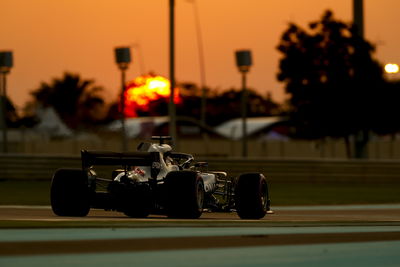
The Abu Dhabi Grand Prix may be a dead-rubber in relation to the Formula 1 title race, given both championships have already been settled in 2018, yet it did not stop Mercedes from delivering yet another crushing display in qualifying at Yas Marina Circuit on Saturday night.
Gone is the idea that Lewis Hamilton stops caring once his title is won. Since securing the title in Mexico almost a month ago, he has 2/2 pole positions, and will be gunning for a second straight victory on Sunday. Even with nothing meaningful on the line, the Briton is still kicking on at the front of the pack, continuing his supremacy seen through much of the 2018 season.
Yet qualifying in Abu Dhabi on Saturday saw momentum swing both to and from Hamilton. At one stage in Q2, he was a remarkable 0.699 seconds clear of the pack, and more than a second ahead of the closest non-Mercedes driver. Pole position seemed to be his to lose.
A crack came through on his first run in Q3, though, when he made a mistake at Turn 9, locking up briefly and running wide. The mistake may have cost him a tenth or two, yet he still held provisional pole following the opening runs, albeit by a slender margin of just 0.057 seconds ahead of Ferrari rival Sebastian Vettel.
Hamilton managed to hook things up with his second effort, improving by half a second to leave his rivals with a sizeable amount of time to find if they wished to wrestle pole away. But with the track in Abu Dhabi showing significant improvement between runs, and the super-sticky Hypersoft tyres in play, he was not entirely safe.
Kimi Raikkonen was within a tenth of Hamilton heading into the final sector, only for the lap to fade away from his Ferrari as it has tended to for much of this weekend through the tight, twisting section under the hotel. The same was true for Valtteri Bottas in the sister Mercedes, who lost time at Turns 18 and 19, leaving him an agonising 0.162 seconds short.
The final driver to take a shot at beating Hamilton’s time was Vettel, who was over two-tenths of a second up in the first sector before more or less matching the Mercedes driver through the middle portion of the lap.
Once again, though, things slipped away in the closing stages of the lap. Vettel ran wide at Turn 19, clouting the new sausage-kerb barrier installed at the corner to deter drivers from breaching track limits, costing him time. He was more than half a second down on Hamilton through Sector 3, with the final delta being 0.331 seconds, leaving him P3 on the grid.
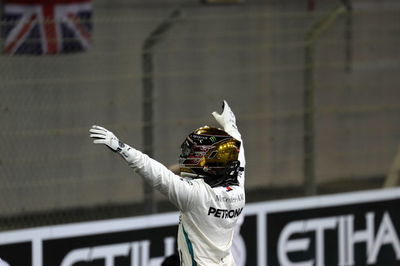
For the fifth year in a row, Mercedes had locked out the front row under the lights in Abu Dhabi, its Silver Arrows – which we can now call the W09, the moniker only being used for title-winning cars – shining brightly.
“It’s quite an emotional qualifying for me, because it’s the last time I’m going to be qualifying in this car,” Hamilton said after jumping out of his W09 on a Saturday for the final time.
“I know you guys watch it, but the emotional rollercoaster I’ve gone through with this car... I’m probably the closest to this car than I’ve been with any car, you know, emotionally attached.”
2018 has been the hardest-won of Hamilton’s five F1 titles, going up against a Ferrari team that, more often that not, had the quickest car. So for him to be ending the year in double-digits for both race wins and pole positions is nothing short of astounding.
Hamilton’s tally of 11 poles for 2018 is just one of a number of remarkable stats that can be taken from the end of this year. To finish with double the figure of poles than any other driver, given the might of Ferrari and, on occasion, Red Bull, in 2018 is an enormous achievement. The argument for any driver other than Hamilton being regarded as the greatest qualifier in F1 history is becoming increasingly difficult to make.
And for the five-year period since the start of the V6 hybrid era, and the start of Mercedes’ dominance, Hamilton’s record is even more impressive. In the 100 races through this period, Hamilton has been on pole 52 times. Mercedes has taken 84 poles in the same period. It may have been out of reach for most of the first 59 of those 100 races, but since the start of 2017, things have been far more evenly matched – and particularly this year.
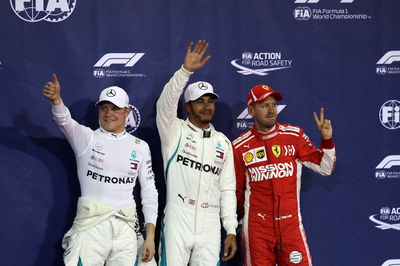
But is there a reason for Hamilton’s post-coronation form taking an uplift in 2018 compared to previous years?
“Not really,” he said. “I don’t think it because I couldn’t do it in the past. I just didn’t do the job.
“I think this year it was being in a different place in my life. I do want to continue to push the limits, push the boundaries and I wanted to finish the season on a solid high if I can, so that I can really continue to keep that foundation as strong as it has been this year so I can use that to start on next year.
“I think in the past it was still good. It was no biggie that I didn’t win after I won the championship, but I’m definitely happy with how it’s going this year.
“There’s still a long race tomorrow, so still got a lot of work to do but really happy with today.”
Hamilton has been on another level in 2018 to any other point in his F1 career. Despite facing his toughest opponents yet, he has seemed hugely content and comfortable, empowering him to deliver some crushing displays on-track. A final win to cap off this year in Abu Dhabi on Sunday may mean little in reality. It would be the cherry on the cake for his season.
But perhaps more significantly, it would act as yet another warning shot to the rest of the F1 world heading into the winter. Lewis Hamilton is better than ever – and it is going to take something remarkable to stop him from steamrollering his way to continued glories in the near future.
